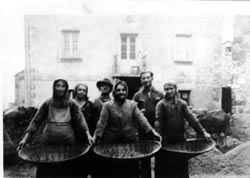| www.fontanarossa.net | |
| Old trades | |
Towards the end of 1900 the land was not enough
for maintaining all the inhabitants of Fontanarossa.
They were hard times and people that did not emigrate were often involved in absurd works. For instance strong teams of young fellows (the “resegotti”) alternated the usual jobs in the fields with the building of big chestnut planks (obtained from big logs by rudimentary buck-saws and their muscles strength). They were used for the construction of walls and flats in the houses: bricks were precious (rare) and expensive! Others were specialized in the pruning and in the graft of plants and, due to their ability, they were requested also in the near villages; perhaps the best pruner of every time was "Mariocca", who was often called to work by the day in the near villages like Alpe, Gorreto or Barchi (to plant, to prune, to graft trees of every kind). For years the strong men of the village, in the hard times went to the Alessandria area (walking through the mountains) to cut plants and the big trunks destined to the heating in Turin, Asti, Alessandria or to the building of railway sleepers. The season lasted around three months and only some lucky men could bring some money to their families. Many of them walked from Fontanarossa to fairs of S. Agata and St. Pietro in Genoa to sell cheese and wheat: the journey through the mountains lasted around ten hours weighting sometimes 50 Kgs., on the shoulders; from a “rubbio” of cheese (8 kgs. of today) a “scudo” was carried (a quarter of 1 Cent at that time).
The activity of our women was really hard and
oppressive. Despite this money was scarce because everything was
drawn from the job in the fields: happy was the family that could
go for the whole year to the old mill for the wheat grinding.
Eddi Biggi |
